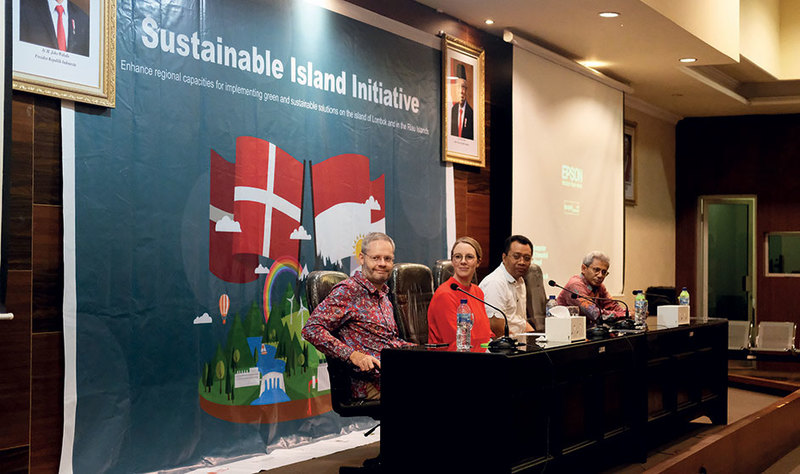
Denmark-Indonesia joint programme, Sustainable Island Initiative launched in Lombok and Riau.
On 27 February, representatives of the Danish Embassy and the Kingdom of Denmark visited Batam as part of the activation campaign for the Sustainable Island Initiative (SII), which is a joint add-on initiative and part of the existing Strategic Sector Cooperation (SSC) within Energy and Environment in Indonesia.
The initiative has been developed by the Danish Environment Protection Agency (DEPA) and the Danish Energy Agency (DEA) in collaboration with provincial authorities from West Nusa Tenggara (NTB) and national authorities in Jakarta. Two islands have been selected for the SII, Lombok Island and Riau Islands (Batam City), by the national authorities.
The SII aims to support islands towards a green and low carbon pathway through more effective solid waste management and sustainable bioenergy solutions. The SII will address strategic challenges as well as constraints in the framework conditions and develop replicable solutions related to solid waste, circular economy and Waste to Energy (WtE).

Approaching the challenges associated with waste and energy planning in an integrated way, a more holistic and systemic approach can be achieved acknowledging and exploiting the inherent interdependencies of solid waste management (SWM) and energy generation. The SII is the first example of two Danish agencies working together on a joint SSC project. The intention is to integrate activities across two traditional sectors to find common solutions within Waste to Energy (WtE).
Many islands in Indonesia experience a rapid growing economy, urbanisation and changing consumer patterns resulting in a pressure on ensuring adequate affordable energy capacity as well as solid waste management. This SII will assist local authorities in implementing national policies and developing replicable solutions to waste management and WtE in an island setting.
The SII also supports several of the Sustainable Development Goals (SDG) such as:
- Ensure availability and sustainable management of water and sanitation for all
- Ensure access to affordable, reliable, sustainable and modern energy for all.
- Make cities and human settlements inclusive, safe, resilient and sustainable.
- Take urgent action to combat climate change and its impacts.
- Strengthen the means of implementation and revitalize the global partnership for sustainable development.
The SII is implemented over a three-year period from 2020 to 2023. The total Danish contribution to the SSC is approximately DKK 7 million, equally shared by the two Danish agencies. The Danish Ministry of Foreign Affairs (MFA) finances 90% of the salaries as well as reimbursable costs, whereas DEPA and DEA finance 10% of salaries and adds other resources based on demands for their respective parts of the joint project.
Activities
The context of Lombok and Riau islands are very different, and the SII will take its starting point in specific challenges and priorities/plans of the local authorities of the respective islands. Some of the main activities that are expected to be undertaken during the coming three years (2020-2023) are the following:
- Technical workshops and sustainability seminars with local authorities.
- Exchange visits to Denmark to learn from experiences in waste and energy sectors.
- Pre-feasibility/baseline study.
- Assessment of potentials for effective solid waste management, Waste to Energy (WtE) and biomass projects.
- Development of a cross-sectorial technology catalogue for SWM and energy production at the two islands.
- Assessment of energy production and potential mitigation of fossil fuel consumption.
- Identify possible barriers for grid integration of WtE and integration between waste management and renewable energy.
- Advice on effective waste governance, regulation and management
- Technical workshops and peer-to-peer training on reduction, reuse and recycling of waste as well as waste data management. Issues related to institutional, management and finance of waste management will also be included.
- Dialogue and assistance to provincial and municipality decision-makers on how sustainable projects can be developed, and private sector investments attracted.
- Assistance to formulate concept notes for sustainable WtE projects.
The SII uses a flexible and demand-responsive approach to implementation of activities, and adjustments of activities might be undertaken, in consultation with national partners, during implementation of the project.






